By John Horton
There is much work to be done when it comes to the “education of our children.”
As parents we need to understand the following wise adages:
- “We are our children’s keepers.”
- “If one is not a part of the solution, then one is a part of the problem.”
- “For our children to be successful, all we need to do is give them their ‘roots’ and their ‘wings.’”
As such, early on, our children need to understand the value of self-discipline and personal priorities and the worth of a good education and meaningful work skills. They need to understand that a good education is the stepping-stone to competence and excellence. And, meaningful work skills are the key asset to ownership and independence.
The best time to implement grass roots structure and basic foundation is in the early years of childhood development and education. Beginning then, we need to devise an educational program that is effective, meaningful and beneficial for (all) our children. We, as parents and a society, have to make up our minds and go after what we want…and our children need.
As parents, our children need to “believe in” themselves and their abilities. Parental involvement needs to begin at birth. Parents (mothers and fathers) must nurture and motivate children from infancy. This should be an ongoing and unrelenting task. Child development researchers and early education experts generally agree that the first 5-6 years are the most important ones in determining if a child will be successful in school…and later in life.
Being a supportive and involved parent is one of the most challenging jobs there is. We are responsible for so much: our children getting enough sleep, eating right, getting to school on time, doing homework, dressing appropriately, staying out of trouble, having a positive attitude, remaining focused and determined, and all the rest that will be required of them. With in-depth parental involvement, our children can overcome almost any obstacle(s) and compete with the best of them.
When it comes to raising successful children, parents must emphasize and reinforce an environment of “higher expectations.” Plainly speaking, no one can rise to low, or nonexistent, expectations. A famous Gothic quotation says: “If you treat an individual as he is, he will stay as he is, but if you treat him as if he were what he ought to be and could be, he will (usually) become what he ought to be and could be.”
Furthermore, as parents, we must get our children to understand that it is not as difficult as some may think to get a good education. Basically, there are “three secrets to acquiring a good education”: (1) attend school on a daily/regular basis; (2) behave in accordance with regulations; and (3) do the class work and homework to the best of your ability – when necessary, don’t be hesitant to ask for help. When you put your mind to it, it’s that simple and achievable. In short, take pride in yourself and your work.
As parents, we must not be hesitant, afraid or ashamed to seek help, counseling and facilitation if needed. And, we must learn to do it as soon as the need arises. We need to be honest and realistic with ourselves as parents. Many of us do not have the in-house resources and wherewithal to carry out our parental responsibilities and duties, therefore, we must develop our “parenting skills” and secure mentoring and tutoring for our children, if need be. We are our children’s most valuable support system. They are our primary responsibility and ongoing endeavor. If it is to be, it is up to us!
As parents, we can become allies of teachers in their efforts to properly educate our children. We can ensure that our children give teachers all due respect and full cooperation. We can solicit teachers’ advice, opinions and ideas. And, we can demand that public officials, school boards and policymakers do their jobs in the best interests of all concerned. Moreover, we can take a proactive role in establishing a grass roots impetus and collaborative relationship between parents, citizens, public officials, policymakers, administrators, teachers and students.
Together, we can do this! Enough said, let us now do what needs to be done. What a great gift to give (our) children!




